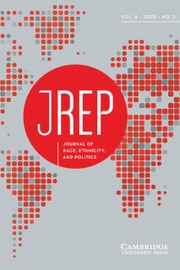In the article by Zhirkov and Valentino (online ahead of print), the footnotes are assigned to the wrong in-text citations as follows:
1Results do not change when controlling for demographics. See Figure S1 in Supplementary Material.
2Unfortunately, we cannot test this explanation directly. Negative D-scores could of course be the result of strong mental associations between the Republican Party and blacks (rather than whites) while not having a strong schema about the Democratic Party. Substantively, that would be “negative projection,” or imposing the racial outgroup identity onto the out-party. We suspect this explanation is less plausible, especially in the light of findings from Study 3 demonstrating that explicit schemas of the Republican Party as white are uniform in the sample.
3We worried that respondents, especially whites, might underreport the association of the Democratic Party with blacks due to social desirability concerns. If so, the variation of schemas in the population would be underestimated, with more respondents reporting that both parties were white. Underestimating this variance, in turn, would lead to smaller and less significant associations between schemas and other variables of interest. This suggests that our test is a conservative one.
3This change in partisan affect informed by race–party schemas can ultimately lead to sorting. The possibility of white Americans defecting from the Democrats in response to its increasing racial liberalism and the growing share of nonwhites in the party has been shown in the literature before (Hajnal and Rivera 2014; Valentino and Sears 2005; Zingher 2018). Our findings suggest that this process may continue in the foreseeable future.
They should be assigned as follows:
1Unfortunately, we cannot test this explanation directly. Negative D-scores could of course be the result of strong mental associations between the Republican Party and blacks (rather than whites) while not having a strong schema about the Democratic Party. Substantively, that would be “negative projection,” or imposing the racial outgroup identity onto the out-party. We suspect this explanation is less plausible, especially in the light of findings from Study 3 demonstrating that explicit schemas of the Republican Party as white are uniform in the sample.
2We worried that respondents, especially whites, might underreport the association of the Democratic Party with blacks due to social desirability concerns. If so, the variation of schemas in the population would be underestimated, with more respondents reporting that both parties were white. Underestimating this variance, in turn, would lead to smaller and less significant associations between schemas and other variables of interest. This suggests that our test is a conservative one.
3Results do not change when controlling for demographics. See Figure S1 in Supplementary Material.
4This change in partisan affect informed by race–party schemas can ultimately lead to sorting. The possibility of white Americans defecting from the Democrats in response to its increasing racial liberalism and the growing share of nonwhites in the party has been shown in the literature before (Hajnal and Rivera 2014; Valentino and Sears 2005; Zingher 2018). Our findings suggest that this process may continue in the foreseeable future.
The in-text citations are as follows:
This could happen when a respondent holds a strong mental association between the Democratic Party and whites (rather than blacks) while not having strong racial schemas about the Republican Party.1
We were concerned about potential social desirability bias in questions about race and party, but if this bias were strong enough, the test would return null results.2
Since we have found almost no variance in racial schemas about the Republican Party, we focus exclusively on the impact of variation in racialized schemas of the Democratic Party in Figure 4.3
This finding carries profound implications for the ongoing discussion in the discipline about affective polarization in American politics: whites feel colder toward the Democratic Party when they imagine its coalition to be more heavily made up on nonwhites and feel warmer toward the Republican Party when they perceive it to be dominated by their racial group.4


